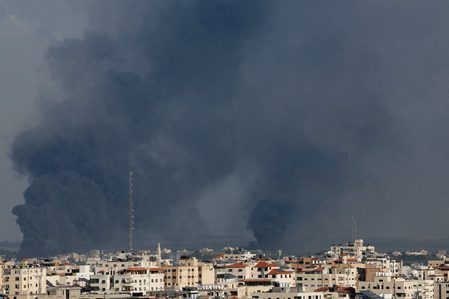MANILA, Philippines – More than 50 Palestinian refugees, who form at least 13 families, are temporarily housed at the University of the Philippines (UP) Diliman, but must find new shelter after December 21 due to limitations in the school’s resources.
Various organizations assisting these families are calling for volunteers and donations. They are hoping to raise enough funds for these refugees to remain together as one community.
The refugees are mostly families of Filipina wives who converted to Islam and married Palestinian citizens, then benefited from the Philippine government’s repatriation program for Filipinos in Gaza. The Gazan refugees initially settled in the UP campus starting late October.
Half of the refugees are pure Gazans – some of whom are professionals back in their homeland.
The groups that mobilized to help the refugees include the Philippines-Palestine Friendship Association (PPFA), Sandugo – Movement of Moro and Indigenous Peoples for Self-Determination, Philippine Palestine Solidarity Center, and the University of the Philippines Student Regent.
“The PPFA, they were the first to respond, and sought our help through this UP engagement. They think that because we are national minorities, like we work with Lumads, we work with Maranaos in the Marawi siege… UP, through the student regent talked directly to the chancellor because I think UP has a statement that was released supporting Palestine,” said Sandugo Movement co-chairperson Amirah Lidasan, in a mix of Filipino and English.
Through its previous engagements, such as its annual Lakbayan for Lumad communities, UP Diliman has sought to be a sanctuary for marginalized communities and national minorities.
According to Lidasan, various advocacy groups reached out to the UP Student Regent for assistance to house refugees within the campus. Through this combined effort, the Philippine Palestine Solidarity Center was formed.
Lidasan pointed out how Gazans have suffered much violence yet have only left their homes for shelter in a foreign country during this recent war.
“Actually, ngayon lang kami nakameet ng Gazans, I don’t know kung papaano kasi ‘di naman talaga sila umaalis sa kanilang lugar. Nung nagkaroon ng repatriation, doon mo na makikita na talagang karamihan ay Gazans,” said Lidasan.
(Actually, it is the first time we met Gazans, I don’t know how because they don’t really leave their place. When there was repatriation, we noticed that most of them were actually Gazans.)
The UP Student Regent also lent their support to raise awareness for the refugees’ plight through the UP system-wide Day of Solidarity for Palestine on December 7 which consists of donation drives and other activities to support their needs.
Assisting refugees
While the university offered its facilities for their shelter, students and professors took part by donating clothes and cooking food for the refugees. Religious Muslim groups such as Tahabas Man Foundation also helped build a makeshift kitchen for refugees so they could prepare their own preferred Palestinian food.
Apart from in-kind donations, there are also available centers offered by religious groups in Southern Tagalog and Cavite that house refugees privately. Certain individuals also helped by setting up their own donation drives on social media and helping crowdsource for leads to possible shelters.
However, Lidasan also said that, despite the outpouring of support from groups and individuals, there is a limit to these resources. Private efforts are filling gaps in government policy. She urged government to play a bigger role.
While the government had promised to give its “utmost support” for Filipino refugees and their families, most of them still do not have a place to go upon arriving in the Philippines. According to Lidasan, there were even reports of Filipinos being stranded in airports. Thus the need to keep releasing press conferences and connect with different centers that are willing to host families.
“They [government] played the hero that yes we will repatriate the Filipinos…but they also created a problem because where will these families go? If they promised you, how far is the repatriation?,” she said.
To address these gaps, Lidasan demands that the government boost additional support for these families.
“Sagutin nila yung rights na dapat na ibigay sa mga kasamahan nating Palestinian as refugees, and itong hinihingi nitong mga kababayan natin – kasi pamilya ‘yan na pinromise-an so dala-dala nila yung bulk ng families nila na…wala nang connections dito,” she added.
(They should address the rights of our fellow Palestinian as refugees, and what Filipinos are asking for – because they promised to those families and they are bringing the bulk of their families here who no longer have connections here.)
Ways to help
Given the current challenge in securing a new shelter for these refugees, religious advocates along with student organizations are calling for volunteers, and accepting monetary and in-kind donations.
You may extend your assistance through the following organizations. All of these will be consolidated through the Philippines-Palestine Friendship Association:
- Philippines-Palestine Friendship Association
- Philippine Palestine Solidarity Center
- UP Office of the Student Regent
- Philippine Collegian
- Kabataan Partylist
Aside from the donations, Lidasan highlighted that it is also important to amplify their voices and give them a platform to air their concerns.
“Amplify their voices, tell their stories about them. So let’s help, that’s what we’re asking the public… Let’s give [them] dignity,” Lidasan added in a mix of English and Filipino. – Rappler.com
